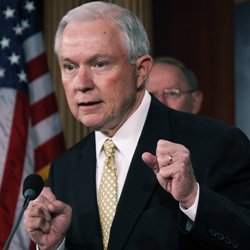Next AG Pledges to Revisit 2011 DOJ Wire Act Opinion

On January 10th, Jeff Sessions appeared in front of the Senate Judiciary Committee where he attended a confirmation hearing ahead of his appointment as the USA’s next Attorney General. Throughout the day, the Alabama Senator was asked questions across a range of topics, including his opinion of the Department of Justice’s reinterpretation of the Wire Act in 2011 which subsequently paved the way for individual states to establish their own online gambling industries.
In then became apparent that Jeff Sessions may be bad news for the country’s nascent online gambling market, as responding to the question posed to him by Sen. Lindsey Graham, he replied:
“I did oppose [the 2011 DOJ opinion] when it happened, and it seemed to me to be unusual. I would revisit it or make a decision about it based on careful study. I haven’t gone that far to give you an opinion today.”
Reporting from Capitol Hill during the hearing was Michelle Minton, a policy analyst for the Competitive Enterprise Institute (CEI), and commenting on Sessions’s response she subsequently tweeted:
“Sessions “opposed” DOJ Wire Act memo, but *now* he says he needs 2 study issue b4 forming opinion? Sounds like his mind’s already made up.”
iGambling in the US
There are currently three states in the USA with online gambling industries, namely Nevada, Delaware and New Jersey. While their market’s growth has taken time, there are now signs that iGaming is beginning to produce tangible results for their respective economies, with the prime example provided by New Jersey.
According to the Garden State’s latest casino results, its online gambling vertical generated $196.7 million in revenues for 2016, a figure that was not only a 32.1% improvement compared to the previous year, but was also responsible for lifting the entire casino industry from a 0.3% loss to a 1.5% gain for 2016.
Needless to say, New Jersey would fight to ensure its iGaming market is not dismantled, and together with Nevada, and Delaware would most likely sue in order to maintain control over their own gambling laws.
Other States Would Oppose Ban
Although no state has passed online gambling legislation since 2013, a number are currently debating the merits of legalizing the vertical, including California, Pennsylvania, New York, Michigan, and Massachusetts. They could then reasonably be expected to oppose any potential ban, as could those states which have already introduced online lottery sales, such as Georgia, Kentucky, Michigan, and Illinois.
Then there are the nine states which have embraced the upsurge in interest for online daily fantasy sports by introducing regulation, which would also be willing to oppose a federal ban on online gambling. These include Colorado, Kansas, Missouri, Mississippi, Tennessee, Indiana, New York, Massachusetts and Virginia.
Exemptions Necessary
Assuming that Sessions is confirmed as the next Attorney General, and that he does eventually manage to roll back the 2011 opinion of the Wire Act, then he will still likely need to carve out a slew of exemptions to the changed law or else face a backlash from those states already with thriving industries.
To illustrate the point, a prior case involving Mastercard International Inc. v. Lyons, which considered whether the Wire Act was “intended” to prohibit all types of gambling, the U.S. Courts of Appeal for the First and Fifth Circuits sided with the law’s current interpretation. Nevertheless, if the Restoration of America’s Wire Act (RAWA) is ever passed then such a positive outcome is likely to become significantly more problematic to overcome in court.
PPA Lends its Support
The Poker Players Alliance (PPA) obviously took a keen interest in Sessions recent hearing in front of the Senate Judiciary Committee, and after hearing his comment about carefully studying the Wire Act’s current interpretation, PPA Executive Director John Pappas expressed his view that any such careful study undertaken must surely result in a conclusion commensurate with the decision provided by the Department of Justice. Elaborating further, Pappas explained:
“We also trust that he adheres to the longstanding practice of giving ‘great weight to any relevant past opinions’ when he reviews OLC’s 2011 position with regard to the Wire Act. The precedent of giving weight to prior OLC decisions is something both the Bush and Obama administrations advised in published ‘Best Practices’ memorandums.”









